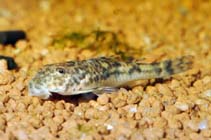| Family: |
Loricariidae (Armored catfishes), subfamily: Hypoptopomatinae |
| Max. size: |
5.78 cm SL (male/unsexed) |
| Environment: |
demersal; freshwater |
| Distribution: |
South America: Paraiba do Norte and Piranhas rivers in Paraiba State, Canhotinho River in Pernambuco State, a tributary of the Mundau River, flowing near the city of Maceio in Alagoas State, and Salgado River in Ceara State, Brazil. |
| Diagnosis: |
Dorsal soft rays (total): 8-8; Anal soft rays: 6-6. Odontodes at tip of snout almost as long as wide, spatulate and with tip round or heart-shaped; first unbranched ray of pectoral fin with long and soft portion equivalent to one fourth to more than half length of hard part; arrector fossae aperture on each side of scapular bridge very wide, equivalent to about one fourth of body width; large naked area around anus; anterior dorsal profile strongly elevated from snout tip to median interorbital region, almost straight to dorsal-fin insertion, and almost parallel to longitudinal body axis; interorbital distance narrow, eye diameter 0.9-1.4 times in interorbital distance (Ref. 47353). |
| Biology: |
Inhabits flat areas of shallow clear waters with low current and sandy and rocky bottom (Ref. 47353). |
| IUCN Red List Status: |
Least Concern (LC); Date assessed: 07 November 2018 Ref. (130435)
|
| Threat to humans: |
harmless |
Source and more info: www.fishbase.org. For personal, classroom, and other internal use only. Not for publication.

